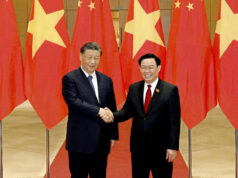HAL ejects UK from TEJAS Jets

In an anticipated and a very much required move, India is determined to export its single-engine, delta-wing Light Combat Aircraft TEJAS to Argentina. The ejection seat, an important safety feature of this Indian fighter jet, is sourced from British firm Martin Baker.
This is being replaced with the Russian-engineered K-36 ejection seats. This is intended to nullify the British opposition on military sales to Argentina because of their conflict over Malvinas( Falklands). After the replacement, the British can only rave and rant but can do nothing to prevent the sale.
The Zvezda K-36 seat, is a proven ejection seat fitted in both the MiG series and the Sukhoi Su-30MKIs fighter jets. The initially designed seat was the Zvezda K-36D, made in the late 1960s with the specific purpose of protecting the pilots of the MiG-25 Foxbat aircraft. This aircraft was the designed by the famous Soviet aircraft designer Mikhail Gurevich, and it had established unprecedented Mach 3 speed and its capacity for stratospheric sorties.
On August 30, an important diplomatic meeting took place between Dinesh Bhatia, the Indian Ambassador to Argentina, and Brig General Xavier Isaac, the Chief of the Argentinian Air Force. The primary focus of their discussion was the prospective expansion of bilateral ties between the two nations, principally through Argentina’s potential acquisition of TEJAS combat aircraft and helicopters.
The potential procurement of these military assets by Argentina indicates a significant deepening of the strategic partnership between the two countries.
An official from HAL has confirmed to a news media that a concrete proposal has indeed been presented to the Argentinians. The process of substituting the British components has already commenced, marking significant progress in this endeavour.
Argentina’s Defence Minister, Jorge Taiana, during his visit to India raised this significant point. He pointed out the presence of 16 components of British origin in the TEJAS. This issue, he stated, necessitated a replacement of these, a consequence of the British embargo on arms sales to Argentina, established in the aftermath of the Malvina Wars.
The United Kingdom has taken action to obstruct Argentina’s attempts to enhance its military capabilities. By imposing embargoes on aircraft components produced within its jurisdiction, the UK has effectively hindered Argentina’s procurement process. Additionally, the UK has exerted diplomatic pressure on Spain, compelling it to abandon an agreement to provide Argentina with surplus Mirage-F1M fighter jets.
To avoid the TEJAS agreement falling prey to British tantrums, the Russian K-36 seats will be installed as replacements for the Martin-Baker ejection seats. The HAL official noted, “We already have the seats available.” The HAL, engaged in the licensed production of the Sukhoi Su-30MKI, is already in possession of K-36 ejection seats. These seats, recognized for their zero-zero capabilities, are widely regarded as equivalent in performance and reliability to their Martin Baker counterparts.
Martin-Baker, a privately held entity, holds a prominent position in the global market for ejection seats. It has a staggering 17,000 of its ejection seats currently in operation across 84 nations in 54 diverse aircraft types, the company’s influence continues to burgeon. This dominance is particularly pronounced in the Western world, where it controls a formidable 75 percent of the market. Key markets include the United States, South Korea, Germany, Italy, and France.
The ejection seat, has a commendable track record of saving lives. To date, 7,699 individuals owe their survival to this critical safety apparatus.
Further British components that pose significant impediments to the successful conclusion of the deal include the Radome, an integral part of aircraft technology, supplied by the UK aerospace manufacturer, Cobham Limited. Additionally, the aircraft tires, a crucial element for the safety and performance of the aircraft, are sourced from the renowned Scottish firm, Dunlop.
It was indeed the Russians who spearheaded the development of the ‘zero-zero’ ejection seat, a revolutionary innovation designed to guarantee the safe evacuation of the pilot even under conditions of zero airspeed and zero altitude.



